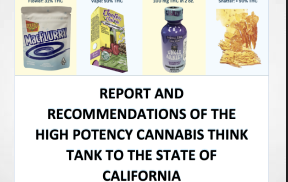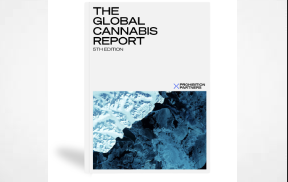October 30 2024
This report was prepared by a committee of scientists and medical experts convened by the California Department of Public Health, in response to a Resolution of the Department of Cannabis Control’s Cannabis Advisory Committee and a Governor’s Directive to provide analysis of the problem of increasing potency of cannabis and cannabis products and to formulate recommendations to address it. The group was also asked to prepare input on implementation of a new legislative requirement (SB540) for consumer information on the issue.
The Committee proposed preparing an independent scientific report based on the scientific literature and knowledge of existing policy. This report and its recommendations represent the independent consensus of the scientific committee and do not necessarily represent the official views of, nor an endorsement by, the California Department of Public Health, the California Department of Cannabis Control, or the California State Government. Acknowledgements: We wish to thank the staff of the California Department of Public Health that convened the Committee and supported our meetings.
We would also like to thank the group of 21 external scientific experts who were invited to anonymously contribute to the Delphi panel consultation. We appreciate the assistance of Allison Temourian, PhD. at UCSF and Kiara Gonzalez Garcia at PHI, who supported report formatting. The Committee was co-chaired by members Silver and Allen.
Evidence reviewed by the Committee finds that there is a pattern of increasing risk with increases in THC concentration. The higher the levels of THC in cannabis and cannabis products, the higher the risk of experiencing adverse events and cannabis use disorder. Adverse events may be immediate or acute or the result of longer-term or prolonged use. Adverse events are more common and can be more intense when cannabis consumed contains 10% THC or more in inhaled products, or 10 mg THC or more in edible products. Frequent use, especially daily or near-daily consumption (20+ days per month) increases the risk of both acute adverse events as well as adverse events associated with prolonged use. Use of high potency cannabis increases risks both independently and in conjunction with factors such as frequency of use and individual vulnerabilities, including genetic predisposition to certain mental health conditions, as well as social determinants of health such as access to healthcare adverse childhood experiences, and exposure to racism. By promoting more frequent and problem use, aggressive production and marketing of high potency products indirectly elevate the risk of other adverse effects by making it harder for individuals to moderate or cease use. Cannabis use disorder, itself an adverse outcome, promotes a cycle of heavy use, leading to further adverse outcomes.
California-High-Potency-Cannabis-Think-Tank-Report-10-30-24
Also read


















